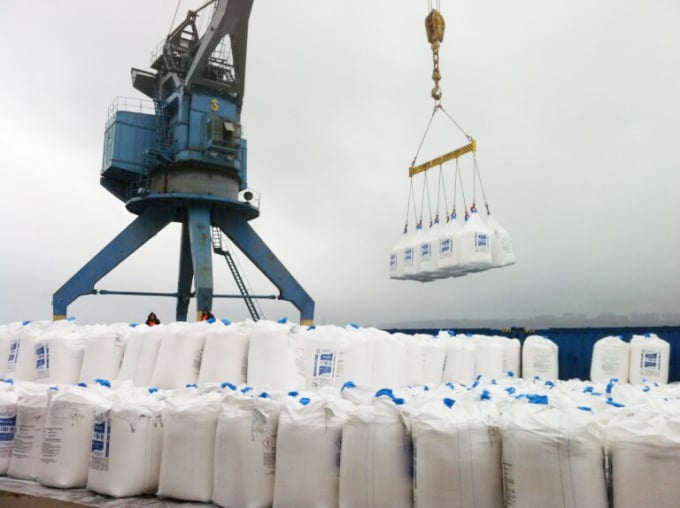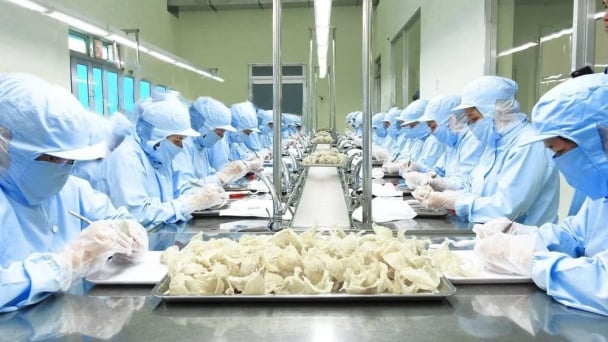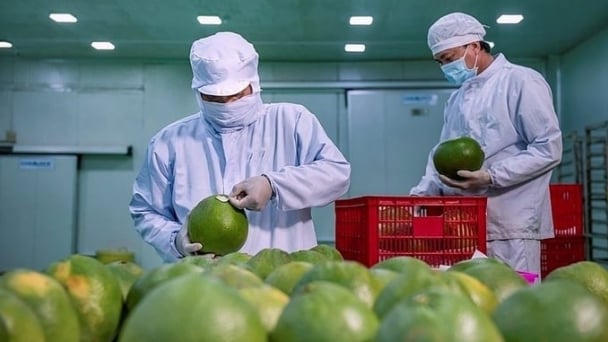May 14, 2025 | 06:58 GMT +7
May 14, 2025 | 06:58 GMT +7
Hotline: 0913.378.918
May 14, 2025 | 06:58 GMT +7
Hotline: 0913.378.918

The Russian-Ukrainian conflict is seriously affecting the global fertilizer market. Photo: TL.
Some businesses in the fertilizer industry informed that the Russia- Ukraine conflict has staggered the import-export activities in Baltic and Black Sea areas.
The main port for fertilizer exports in Russia namely Yuzhny has been closed. A Russian cargo ship was seized in France, vessels flying under the flags of other countries were also struck by missiles offshore the Black Sea. This demonstrated that cargo ships and insurance firms may found hard to accept the risk to guarantee and receive goods from ports in the region.
Russia is the largest natural gas supplier in Europe. The escalation of oil and gas prices has been fueled by the conflict between Russia and Ukraine. The increased momentum of oil price was also consolidated by the recent Russian missile attack carried out on the Vasilkovskaya oil depot of the KLO company (Ukraine) on February 27.
The increase in oil prices also leads to the soar of freight cost and it is expected to rise by 30% in the second quarter from the already unbelievable height.
Russia is also a big fertilizer supplier, accounting for around 30% of the total global fertilizer demands. Especially, Russia provides up to 70% of input materials into fertilizer production in Europe. On the other hand, export restrictions and banning sanctions on some Russian and Chinese main force fertilizer products have no sign of being lifted.
This will cause the reduction in the supply of imported fertilizer including Kali and DAP while Southeast Asia, India, and China are preparing to enter the new crops, pushing the situation on the final slope downward.
Urea suppliers in Southeast Asia are out of stock until mid-April. On March 3, Brunei's chiseled-grained Urea plant declared Force Majeure (force majeure) to refuse to fulfill orders that had been pegged cheaply in February.
Middle East suppliers also decided to halt offerings to follow market developments. Chinese suppliers also sit on the sidelines at least until June and the sources from Russia and Ukraine are unable to get through the borders due to sanctions and conflict escalation.
In short term, there are several foundations to believe that Urea price would return to the rate of USD 800 per ton in April, or even USD 1,000 per ton if the oil price hits USD 150 per barrel.
Under the severe affection from Russia- Ukrain conflict together with sanctions, DAP price is expected to increase soon due to insufficient supply sources from Russia.
On the other hand, OCP Moroco, the world’s greatest distributor with key material being ammonia to produce DAP is now incapable of access to the good sources from Russia, making it possible for manufacturers other than Russia to reduce production by up to 1 million tons of DAP per month from March 2022.
With the aforementioned statistics, DAP price is estimated to return to USD 950 per ton (FOB) in April and it is possible to hit the levels of USD 1,200 or 1,500 per ton when the Brazilian market shows its demands.
In terms of Potash, Belarus and Russia are the world's two largest suppliers, accounting for 40% of global supply. With the current big picture, potassium prices will have a galloping price increase shortly, especially Potash.
Belarus and Russia are the two biggest potassium suppliers in the world, accounting for 40% of the global supply. The current panorama picture shows that potassium price would witness a galloping increase.
Distributors stressed that the Vietnamese market would see the absence of imported potassium from Russia, Belarus while those from Israel and Canada may arise. They also warned the prices of USD 800-850 per ton for powdered seeds and USD 1,000 per ton for the seeds from the second half of June 2022, even up to USD 1,200 - 1,300 per ton by the end of 2022 and early 2023.
Southern provinces of Vietnam are harvesting crops and preparing to plant new ones beginning in the first part of April. While northern provinces are taking care of winter-spring rice crops, posing increasing demands for fertilizers.
Since domestic production outweighed demand, it is uncertain how the urea price in Vietnam may fluctuate in response to global trends. However, due to slight inventory pressure on producers as a result of previous export promotion, there is a possibility that Urea prices would resume their upward trend. F
Domestic DAP supply has yet to be increased due to ongoing disputes over input materials. As a result of the import market blockage, it is anticipated that imported DAP would be in severe scarcity by 64 percent in the second quarter, with the possibility of local prices reaching VND 25 million per ton.
In Vietnam, all potassium fertilizer is imported. The economic sanctions imposed on Russia and Belarus are driving up potassium prices globally. Potassium prices in Vietnam are expected to reach VND 15-16 million per ton for powder seeds and VND 18-20 million for seeds in the coming days. Potassium, DAP, and urea prices will increase, which will increase the price of NPK.
Rabobank (a world leader in agricultural and food financing) has outlined three scenarios for the impact of the Russian-Ukrainian conflict on the global agricultural product market, including fertilizers, in the coming months. In terms of fertilizers, Rabobank stated that global fertilizer prices are now quite high.
If fertilizer exports from Russia and Belarus are halted, the price will continue to rise. Because natural gas is the primary driver of fertilizer producer pricing, fertilizer manufacturers worldwide will be forced to raise input costs, thus increasing prices.
Fertilizer costs are expected to rise between 20% and 40%, depending on the outcome of the Russia-Ukraine conflict and the impact of Western sanctions on Russia and Belarus.
According to Agromonitor, the price of potassium in Vietnam has increased significantly in recent days due to concerns about supply constraints on the global market as a result of Western sanctions on Russia and Belarus, as well as logistical difficulties.
Russia and Belarus account for more than 40% of Vietnam's potassium imports each year. Israeli potassium prices traded in Ho Chi Minh City and Can Tho have surged over their late-2020 peak.
Certain varieties of locally manufactured urea also tend to grow in price or have a restricted supply on the market. Meanwhile, the cost of DAP imported from China has skyrocketed.
According to several fertilizer importers, some Russian banks have been removed from the SWIFT system, creating disruptions in the opening or receipt of letters of credit from Russia by banks in other countries, with payment in USD, Euro, pounds, or Japanese yen unavailable.
Fertilizer importers have spoken with partners in Russia and Belarus, as well as significant banks in Vietnam, but no appropriate payment option has been reached at the moment.
According to Mr. Vu Duy Hai, general director of Vinacam, it is difficult to predict how fertilizer prices will rise, but we must consider the possibility of a peace agreement between Russia and Ukraine or the lifting of Western sanctions. Domestically, if state management authorities act to eliminate import duties and defensive levies, restrict exports, the situation regarding Urea and DAP prices would be cool down.
Translated by Linh Linh

(VAN) U.S. tariffs are not only a 'shock', but also an opportunity for Vietnamese businesses to renew their mindset toward comprehensive development.

(VAN) As Bac Giang lychee enters the harvest season, Minister Do Duc Duy expects that the fruit will contribute greatly to agricultural exports due to standardized production and deep processing.

(VAN) Consumers have shown a preference for free-range eggs, but those farming systems are more vulnerable to biosecurity risks like bird flu.
/2025/05/09/5701-1-184335_301.jpg)
(VAN) Vietnam’s eel exports nearly doubled thanks to a mud-free farming model, opening up new prospects while still facing numerous barriers related to international standards.

(VAN) Minister Do Duc Duy warned that if production is not professionalized and supply chains are not transparent, the U.S. market could become a growth bottleneck.

(VAN) Delegating surveillance responsibilities to local authorities is a cost-saving and efficiency-boosting measure that removes a key bottleneck for enterprises, according to Director General Duong Tat Thang.

(VAN) Australia's final report on biosecurity has just been released, contributing to expanding the market for Vietnam's fruit with an output of nearly 1 million tons.